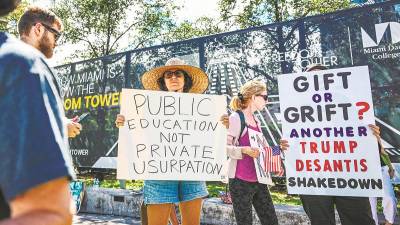THE analogy by critics that US President Donald Trump was fiddling in the United Nations whilst Washington D.C. is starting to burn or is already burned may appear unkind.
But even his most fervent supporters must be wondering how his speech and behaviour in the widely publicised appearance at the UN fits
with the game plan of “Making America Great Again”, which the American electorate has put their faith in him to accomplish.
The main points he made to the representatives of the 193 member countries at the UN General Assembly (Unga) included:
Attack on the UN and globalism: He launched a strong assault on the UN, describing it as “feckless”, “corrupt” and a “pernicious global force” that was not fulfilling its purpose. He explicitly rejected the concepts and principles of globalism
and multilateralism in favour of national sovereignty.
Immigration and border control: A major focus was on immigration, which he called
an existential threat to Western nations. He urged countries, particularly in Europe, to “end the failed experiment of open borders”, “close their borders” and “expel foreigners”, warning that their countries were otherwise “going to hell”. He accused the UN of leading and funding a “globalist migration agenda” that was an “assault” on Western countries.
Climate change and energy policy: He denounced climate change as “the greatest con job ever perpetrated on the world” and heavily criticised the “green energy agenda”. He ridiculed renewable sources like wind farms and promoted the use of “traditional energy sources”, including “clean, beautiful coal”, claiming that high energy costs and “suicidal energy ideas” were “destroying a large part of the free world”.
Trade and tariffs: He reaffirmed his policy of raising tariffs on countries that he claimed had broken international trade rules and “plundered” the factories of nations that followed the rules. Earlier, when announcing the US tariff war, he had used similar aggressive rhetoric to describe a global trade system that the US helped to build after World War II and benefitted enormously from, saying “our country has been looted, pillaged, raped, plundered” by other nations.
Global opinion Critics, including diplomats and commentators from Asean, have viewed the speech as an embarrassing performance and a long and humiliating rant.
Many saw it as a debacle and a caricature of everything the UN was built to prevent. It showed disdain for the organisation’s core mission of global cooperation and objective to bring countries together to ensure peace and security, and meet the challenges of our time.
The address appears to have been mainly directed at developed nations as it singled out European allies over their policies. By doing so, he amplified concerns about the reliability of the US as a global partner.
Analysts had earlier noted that foreign leaders were being forced to recalculate
their national strategies around the unpredictability of US commitments in foreign policymaking. Trump’s speech not only reinforced this perception; it also brought into full view to Asian allies the spectacle of a new American determination to focus on extraction from them the monies and investment required for the US to return to
the good old days when America was a global manufacturing leader and its economy was the envy of the world.
Some analysts have suggested that while Trump was listened to, he was not believed, noting that his rhetoric – once shocking – was now becoming normalised, chipping away at the notion of the US president as the leader of the free world.
Fact-checking Trump
Critics have widely noted that the speech was filled with exaggerations, half-truths and false statements.
What Western analysts and media have failed to point out is that Trump’s speech condemning the UN appears ignorant of the fact that it is the US that has been the main stumbling block to the UN becoming a more effective global force.
The US’s record in its adherence to the rules of international law has been abysmal. The US under its presidents since the beginning of the UN has always ranked low on measures of multilateralism and adherence to Unga majority votes.
The newly devised UN-based Multilateralism Index ranks the US as the least committed country to UN-based multilateralism among UN member states or large country groups. This index considers factors such as ratification of major UN treaties, percentage of votes aligned with the international majority at the Unga, contribution to the UN budget and use of unilateral coercive measures.
US government agencies appear to be proud of the country’s obstructionist and counterproductive role in the UN, with the Department of State 2022 report noting that the average voting coincidence between the US and other Unga countries was 48% for contested resolutions.
The US also voted against 53% of contested Unga resolutions in 2022, the most of any member state besides Israel. The percentage of US votes aligned with the international majority has been reported to be less than 25% in recent years, for example, 2018 to 2022.
Perhaps the only positive takeaway from Trump’s speech was his call for world leaders to combat the spread of nuclear and biological weapons. This won’t make any impression on the committee now deliberating on the Nobel peace prize winner for this year to take special notice.
Uncovering Trump’s real audience
The overall consensus is that the speech was primarily aimed at energising Trump’s domestic political base rather than engaging seriously with the international community.
The attack on the international order may distract from the internal strife and turmoil churning in US politics, economy and society, and provide Trump with some relief as his approval rating drops further. However, it is creating an opening for BRICS and the Shanghai Cooperation Organisation member countries to enhance their position and standing as defenders of a fairer global system.
Trump’s obsession with self-interest, spectacles and personal grievances, while exacerbating the serious existential threats to his nation, may turn out to be a key game changer in international politics.
Lim Teck Ghee’s Another Take is aimed at demystifying social orthodoxy.
Comments: letters@thesundaily.com
